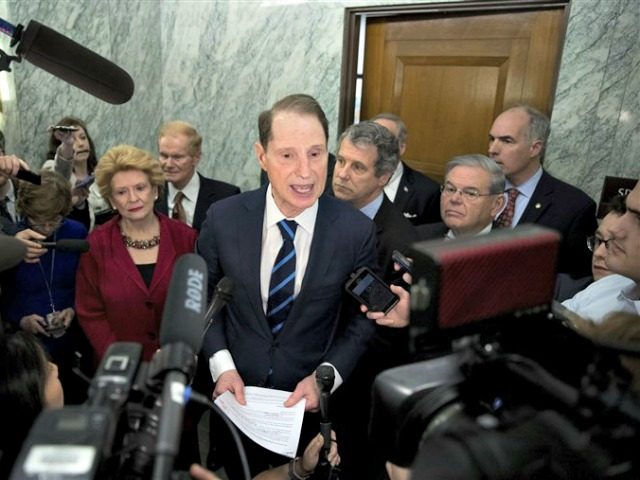Sen. Ron Wyden (D-OR) said in an interview with Recode on Wednesday that he will draft a new bill to legislate “consequences” for social media platforms that do not censor figures such as Infowars’ Alex Jones.
Wyden, a champion of digital privacy, told Recode that he is drafting a new privacy bill that would enshrine legal “consequences” against social media companies and other platforms for hosting content that violates “common decency.”
As Infowars’ Paul Joseph Watson noted, Wyden’s definition of “common decency” is “wide open to interpretation and will obviously be skewed by political bias.”
Facebook, YouTube, Pinterest, Apple podcasts, Spotify, LinkedIn, and Disqus recently banned Infowars and Alex Jones for violating their “hate speech” clauses.
“I think what the Alex Jones case shows, we’re going to really be looking at what the consequences are for just leaving common decency in the dust,” Wyden said.
Wyden continued:
What I’m going to be trying to do in my legislation is to really lay out what the consequences are when somebody who is a bad actor, somebody who really doesn’t meet the decency principles that reflect our values, if that bad actor blows by the bounds of common decency, I think you got to have a way to make sure that stuff is taken down.
The Oregon Democrat then pivoted and suggested that Republicans such as House Majority Leader Kevin McCarthy (R-CA) and Sen. Ted Cruz (R-TX) want the government to “run private companies” and “dictate to private companies what they’re doing,” even though Wyden plans to draft legislation to punish social media companies if they do not censor those who violate his “common decency” standard.
Majority Leader McCarthy (R-CA) and Sen. Cruz are two of the most prominent Republicans to rail against Facebook, Google, and Twitter’s censorship practices.
In a veiled threat, Wyden said that he wants to see social media “companies step up.”
“If we were talking about really horrible pornography, I think they would have moved pretty quickly to deal with it,” the Oregon Democrat said. “I think it’s also worth noting that, with respect to Alex Jones, there are probably a thousand accounts out there that are as bad as Alex Jones.”
Democrats would likely take up Sen. Wyden’s legislation should the party retake the House and the Senate.
Sen. Wyden also helped to draft the Communications Decency Act of 1996, which established the “Safe Harbor” provision in Section 230 of the bill. Section 230 allows Internet service providers (ISPs) and edge providers such as Facebook and Google to host or publish other users’ content without being legally liable for their users’ content.
Wyden told Recode that Section 230 created a “shield” to prevent social media companies from frivolous lawsuits, and also gave these companies a “sword to deal with irresponsible conduct.”
“And we can stop there because part of the reason the companies are in so much trouble is that they haven’t been using the sword,” Sen. Wyden added.
Tech experts and former regulators have contended that Section 230 allows for social media companies to censor without legal recourse.
Former Federal Communications Commission (FCC) Wireless Bureau Chief Fred Campbell told Breitbart News in an interview in August that Safe Harbor violates the First Amendment and overrides common law protections against libel and other falsehoods.
“They’re subject to a legislative exception that is a couple decades old, overturning a century of law. If they want to play editor, great, then comply with the laws that all of the others editors comply with and give up your special exemption,” Campbell charged.
Campbell also said, “We the people should decide whether” Google and Facebook can censor and block content.

COMMENTS
Please let us know if you're having issues with commenting.